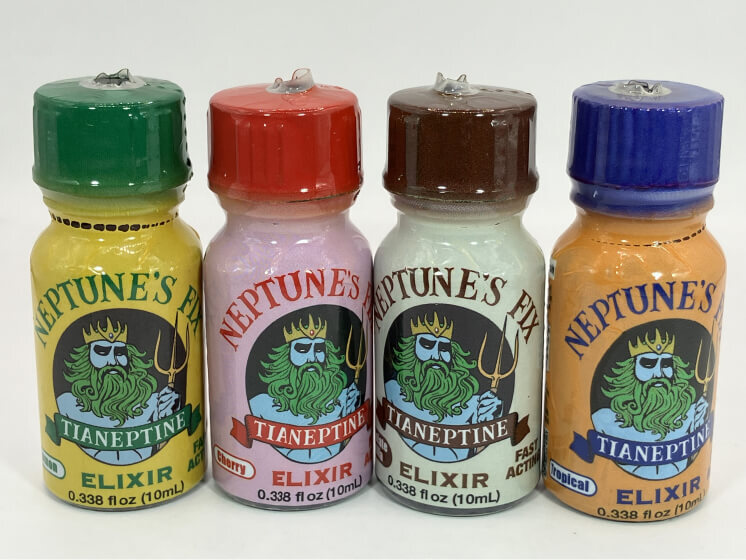Tianeptine
What is tianeptine?
Tianeptine is an atypical tricyclic antidepressant with opioid receptor activity that is being marketed in gas stations, smoke shops, and other roadside stores as a “dietary supplement” under the name Neptune’s Fix, Tianaa, or Za Za. Some people refer to it as gas station heroin.

Tianeptine is not an FDA-approved medicine, and it does not qualify as a dietary substance. To get around Federal regulations, tianeptine is typically sold as an adulterated dietary supplement (which means other potentially toxic substances may also be present) or sold as not for human consumption. In Alabama, Michigan, and Minnesota, tianeptine is a scheduled controlled substance and at least seven other states in the U.S., (including Florida, Georgia, Indiana, Kentucky, Mississippi, Ohio, and Tennessee) have banned or severely restricted sales. In other states, it is technically legal since it sits in a gray area – it is not FDA-approved but neither is it a controlled substance. Just because the FDA is unable to control the sale of tianeptine, does not mean that it is safe.
Overseas, tianeptine was reclassified in France in 2012 as a narcotic after an analysis determined that the benefits of using the drug for depression did not outweigh the risks. Other countries, such as Armenia, Russia, and Ukraine classify it as a psychotropic substance while some, such as Spain (brand name Zinosal), have no restrictions on its use. Other international brand names include Coaxil, Stablon, and Tatinol. Tianeptine is not approved in Australia, Canada, New Zealand, or the United Kingdom.
How does tianeptine work?
Tianeptine works on chemicals within the brain such as serotonin and at low doses can affect mood. Its main use in countries (not the U.S.) where it is a prescription medicine is for treating depression, although anecdotally it may also work to relieve pain, anxiety, asthma, and irritable bowel syndrome.
At higher dosages, tianeptine works like an opioid (narcotic), affecting opioid and glutamate receptors which results in a short-lived euphoria, or high. Overall, it has a very high risk for addiction and abuse.
How long does it take to get addicted to tianeptine?
Data indicate tianeptine may be similar to opioids in terms of addiction and withdrawal potential as well as withdrawal symptoms. Although the exact length of time it would take someone to become addicted to tianeptine is not yet known, case reports suggest it could take as little as a few weeks with regular use.
People quickly develop a tolerance to tianeptine which causes them to increase how much they take, which is a clear sign of addiction and dependence. To stop themselves from going into withdrawal, some set an alarm to wake themselves up every two hours to take their tianeptine pills.
Tianeptine is often marketed as all-natural, which makes it hard for people to grasp its dangers, especially when it is sold so freely in roadside stores. But the potential for abuse of tianeptine and the toxicity it causes outweigh all benefits. In 2023, 391 cases of tianeptine poisoning were reported in the United States. This compares to 151 cases in 2020, and only 4 in 2013. Some of these poisonings occurred the first time people ingested the substance.
What are the side effects of tianeptine?
At low dosages, common side effects may include headache, dizziness, constipation, dry mouth, drowsiness insomnia, or nightmares.
With higher dosages, tianeptine can cause serious side effects, some of which have caused death. These may include:
- Cardiovascular effects, such as an increase in blood pressure which increases the risk of having a heart attack or stroke
- Liver and kidney damage
- Addiction and dependence – both physical and mental
- Overdose symptoms, such as an irregular heartbeat, difficulty breathing, seizures, hallucinations, and loss of consciousness
- Withdrawal symptoms.
Tianeptine withdrawal
Serious withdrawal symptoms needing hospitalization or continued recovery in a long-term rehab center have occurred in people who stop tianeptine suddenly after regular use. The symptoms are similar to those seen with opioids and may include:
- Nausea or vomiting
- Flu-like illness
- Muscle aches
- Tremors
- Depression
- Anxiety
- Strong cravings for tianeptine
- Seizures.
Initial withdrawal symptoms usually last 5 to 7 days and admission to an intensive care unit is often needed because the symptoms are so bad. It can take weeks or months to recover from post-acute symptoms.
Can you overdose on tianeptine?
Deaths from overdose of tianeptine have been reported in the U.S. and overseas. At high doses or in combination with other substances, tianeptine can be dangerous. Most overdoses require naloxone and/or high doses of sedatives to manage.
See also
- Bath Salts
- Cannabis
- Cocaine
- Devil's Breath
- Ecstasy
- GHB
- Gray Death
- Hashish (Hash)
- Heroin
- Ketamine
- Krokodil
- LSD
- Marijuana
- MDMA (Ecstasy, Molly)
- Mescaline (Peyote)
- Opium
- PCP (Phencyclidine)
- Psilocybin (Magic Mushrooms)
- Quaaludes
- Rohypnol
- Speed (methamphetamine)
- Synthetic Cannabinoids (Synthetic Marijuana, Spice, K2)
- TCP (Tenocyclidine)
- U-47700 (Pink)
- Xylazine (Tranq Dope)
Sources
- Tianeptine. PubChem. National Library of Medicine. https://pubchem.ncbi.nlm.nih.gov/compound/68870#section=Related-Compounds
- How Long Does It Take To Get Addicted To Tianeptine? The Summit Wellness Group. https://thesummitwellnessgroup.com/blog/how-long-does-it-take-to-get-addicted-to-tianeptine/
- Tianeptine Abuse, Addiction & Recovery FAQ. Recovery Centers of America. https://recoverycentersofamerica.com/substance-guide/tianeptine-abuse-addiction/
- Hoffman J. Jan 10, 2024. ‘Gas-Station Heroin’ Sold as Dietary Supplement Alarms Health Officials. The New York Times. https://www.nytimes.com/2024/01/10/health/gas-station-heroin-tianeptine-addiction.html
Further information
Always consult your healthcare provider to ensure the information displayed on this page applies to your personal circumstances.
